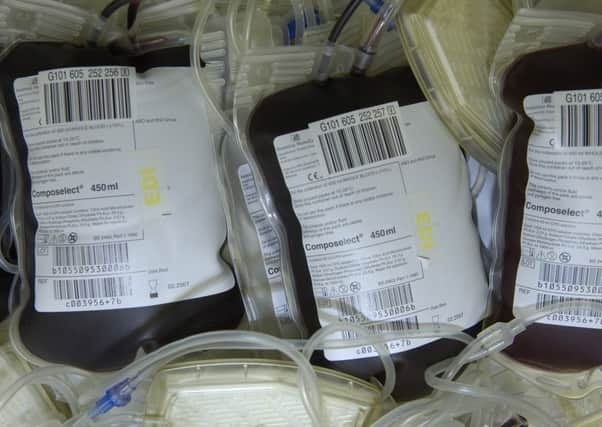Lizzy Buchan: Knowing your blood type can help keep stocks topped up


It is also how long it takes to donate a pint of blood that could easily save someone’s life.
From dramatic major surgeries and car crashes, to childbirth and cancer treatment, many of us will need a blood transfusion at some point in our lives.
Advertisement
Hide AdAdvertisement
Hide AdThe benefits of giving blood are obvious but a new campaign launched this week raised questions about why so few people actually donate. Analysis by the Scottish National Blood Transfusion Service (SNBTS) found that only four per cent of eligible Scots are active donors, which is defined as those who have given blood in the last year.
That is a staggeringly low proportion of the population, whichever way you look at it.
What is worse is that the number of new blood donors has dropped by 30 per cent over the last five years.
The SNBTS has warned that the service is being forced to increasingly rely on older donors, who regularly give blood, to ensure they have enough stock.
An increase in popularity for exotic holidays and tattoos could be to blame for the falling numbers of young donors, as visitors to popular destinations such as South Africa and India have to wait 12 months to avoid the risk of blood-borne viruses such as malaria.
Younger people also tend not to become repeat donors compared with their older counterparts.
There will always be restrictions on giving blood to ensure it is safe, but there are serious questions to be asked about why only 4 per cent of Scots are able to donate.
This week saw Scotland sign up to the global Missing Type campaign to encourage people to find out their blood type. Most of us know our date of birth, our nationality, our vital statistics, but do you know which of the eight blood groups you belong to?
Advertisement
Hide AdAdvertisement
Hide AdAccording to the SNBTS, only 38 per cent of Scots know their blood type, which rises to 61 per cent among those who have given blood.
Blood type is not routinely recorded in a person’s medical records so many people may not know whether they are an O, an A or a B. Most people only find out if they have a blood transfusion or if they have given blood.
Apart from the fact that it is probably better to know these things than not, the SNBTS says it is also vitally important for donors and the wider public to know their blood group, as not every donor can help every person.
The eight to ten pints of B positive blood coursing through my veins can only help the 9.2 per cent of Scots who share my blood type, and the 2.7 per cent who are AB positive, whereas someone with O type blood can help almost anyone.
The SNBTS faces a daily balancing act to ensure there is enough blood from each type to go around.
Blood cannot be stockpiled for longer than 35 days so it also needs to be careful it has the right quantities and none is wasted.
If there is greater awareness among donors and the wider public of what their blood type is, then that could help the SNBTS to target people if they are running really low of stocks of B positive.
There is still a long way to go to persuade people that donating blood is not as scary as it seems, but campaigns like the Missing Type are a good start to changing attitudes.